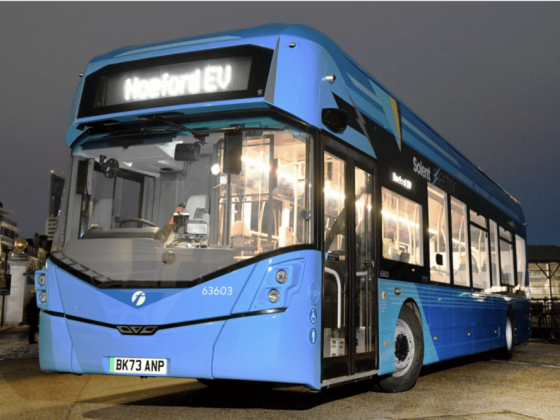Which fuel-saving products deliver the goods?
When it comes to reducing carbon from the HGV sector, how do you know what retrofit technologies will actually deliver on their claims? LowCVP’s Andy Eastlake explains how a new accreditation scheme will test fuel saving products in realistic HGV operating scenarios to give fleet managers trustworthy and accurate information.
 Sorting the wheat from the chaff may be an agricultural analogy but away from the farming sector it’s a challenge faced by every fleet manager striving to reduce his or her fuel bills. How do you select the right innovations from all the salesmen knocking on your door claiming emissions and fuel improvements?
Sorting the wheat from the chaff may be an agricultural analogy but away from the farming sector it’s a challenge faced by every fleet manager striving to reduce his or her fuel bills. How do you select the right innovations from all the salesmen knocking on your door claiming emissions and fuel improvements?
Running local trials of every potential product is clearly not an economic proposition and getting conditions sufficiently controlled to be able to determine what may be small percentage changes in efficiency or performance is often impossible under public road conditions.
The Low Carbon Vehicle Partnership has been working to address this challenge and to encourage the transfer of the existing technologies – such as low rolling resistance tyres and aero packages among others – to get them ‘off the shelf and on to the road’.
The LowCVP and its members, with the support of OLEV and the Department for Transport, has developed an industry standard accreditation process to provide a robust assessment of the emission and fuel consumption benefits from any technology for a wide range of commercial vehicles. The aim of the initiative is to help fleet managers to separate the wheat from the chaff.
HGVs and rising emissions
Commercial vehicles have been contributing a rising share of road transport emissions, and now account for over 30 per cent of the CO2 emissions from the sector. While emissions from HGVs are down by around nine per cent since 1990 (2014 figures), emissions from vans have grown by 48 per cent. Commercial vehicles are now the biggest user (50 per cent) of diesel on the road (DUKES Govt stats for 2015) so focus on this sector for both carbon and air quality emissions is of critical importance.
Announced by the transport Minister Andrew Jones MP on 30 June at this year’s LowCVP conference, the new scheme is the culmination of two years of work by a wide range of stakeholders. More recently, Transport for London via their LoCITY initiative have supported extending the test cycles to include a congested city cycle specifically for the van and light truck sector operating in the urban environment.
Speaking at the LowCVP conference, the minister explained that the Low Carbon Accreditation Scheme for HGV technology is designed to tackle one of the main barriers to the adoption of lower carbon, cleaner and more efficient commercial vehicles in the UK.
Building confidence
In previous research the LowCVP had identified the opportunities for reducing carbon from the HGV sector, establishing that the primary barrier to uptake of fuel saving equipment is confidence over the business case. The overriding concern is: what is the real fuel saving in use and what is my payback?
Drawing on a wide range of UK and international activity and experience, the LowCVP-led project has developed an accurate, reproducible and representative procedure for measuring the operations of trucks and vans used for carrying freight. The procedure enables equipment manufacturers or vehicle operators to conduct robust and reliable tests to validate the impact on fuel consumption and emissions of retrofit technology – such as low rolling resistance tyres and aerodynamic additions, or engine efficiency technology – under a range of representative operating conditions.
A common approach
Many operators have previously conducted work both on the road and under test track conditions, but to date there has never been a common approach to allow the industry to maximise the benefits and relevance from each test. This scheme therefore helps both the customers (operators) and the suppliers through having a single approved and independent assessment and certification of the technology with easy-to-understand results which are relevant directly to the operator.
Already the process has been used to test the latest generation of gas-powered HGVs (both dedicated vehicles and dual fuel conversions) for the Department for Transport to inform future policy in fuels.
This work is expected to be published in the early autumn in conjunction with the results from a 350 truck trial programme which is also completing this year.
The scheme will provide information on the operational characteristics of the technology, providing practical information to operators on its potential applicability.
The test and accreditation scheme is to be focused on proving existing technology in a robust back-to-back comparison under realistic HGV operating scenarios.
Uniquely, the programme development has been constantly reviewed by a very wide range of LowCVP members including the Freight Transport Association (FTA), Road Haulage Association (RHA) and the LoCITY programme, and it is hoped that the scheme will complement the range of carbon reduction initiatives currently supported by these organisations by providing enhanced emissions reduction data.
Industry partners
Developed with support from the Office for Low Emission Vehicles (OLEV) and the Department for Transport (DfT) and also drawing on European work on HGV carbon measurement, the scheme is being introduced following collaboration with key partners involved in the industry including: Horiba Mira, Millbrook, TRL, Michelin, Stobart Group, Mercedes Truck, Transport for London (TfL) and the Transport KTN.
Test cycles have been developed for typical truck operations including long haul, regional and urban operations, plus the new LoCITY‑developed City Centre Driving Cycle.
Discussions are already under way to identify the work needed to develop cycles suitable for refuse and construction vehicles given the bespoke nature of these applications.
The test, utilises the latest portable emissions measurement systems as required by legislation and now widely used across the world. The critical aspect of the LowCVP scheme is, however, the repeatability of the testing cycles across a range of approved facilities, which allows results to be directly compared.
Validating the technology
With the launch of the scheme and publication of the testing guidance on the LowCVP website, project leaders will be engaging with UK operators and the HGV market to disseminate information about the Accreditation Scheme and associated test processes.
David Blanchard, performance durability technical specialist at HORIBA MIRA, said: “The work that we have conducted together with the LowCVP has produced a test protocol that has proven to be robust, with excellent repeatability. We are delighted that fleet operators now have an excellent tool to validate fuel saving technology, which
we hope will lead to the faster adoption of this technology – ultimately leading to a reduction of tailpipe emissions on the UK’s roads.”
Phil Stones, chief engineer for powertrain at Millbrook Group said: “Millbrook is pleased to have been working on this initiative and is proud to see it coming to fruition. We look forward to continuing to test carbon reducing technologies, from tyre technologies and aerodynamic aids to alternative fuels, under the new scheme.”
Andrew Lowery, vice-chair LoCITY HGV Working Group said: “With a wide range of products and services on the market all aiming to reduce vehicle emissions, it is difficult to know which are the most cost‑effective solutions for particular duty cycles. LoCITY therefore welcomes the launch of this technology certification scheme to help better inform fleet operators about how to reduce emissions, cut costs and improve air quality across London and beyond.”
Rachael Dillon, FTA’s climate change policy manager, said: “Adopting operational efficiency measures are key for any commercial fleet operator to improve fuel efficiency and reduce carbon emissions. However too often it is difficult for companies to decipher what the best technologies are out there for them to utilise.
“We welcome and support the Low Carbon Accreditation Scheme developed by the LowCVP to help our members have confidence to invest in technologies that have been independently tested and proven to deliver fuel savings. This accreditation scheme is essential as the sector remains under pressure to reduce fuel use in order to contribute to climate change targets and reduce air pollutants.
“I know that most fleet managers are inundated with inventors and salesmen claiming their product will reduce emissions and save fuel. The LowCVP accreditation process can now provide robust and independent verification of these marketing claims, hopefully allowing fleet managers to focus more effectively on the business of reducing emissions – and costs – from commercial vehicles, and really begin to deliver the goods.”
Further information
www.lowcvp.org.uk



